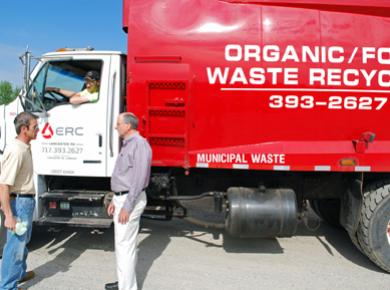Posted: August 27, 2015
Harrisburg, Pennsylvania – “PA 2015 will be green,” says Howard Good, National Coordinator of the Mennonite World Conference Assembly, to be held July 21-26 at the massive Farm Show Complex (FSC) in Harrisburg. Good had just received word that expenses for the green endeavour will fit the projected budget for the global event.
Owned by the state of Pennsylvania, and supervised by the state’s Department of Agriculture, “the Complex and its catering service have been remarkably flexible and open to our ideas and requests,” commented Good.
“Any time someone comes to the table with ideas about how we can be more sustainable as a department, and as state government, I’m right there,” said Hannah Smith-Brubaker, Deputy Secretary of Agriculture and the official directly responsible for the site.
“I see stewardship as part of the Mennonite commitment, and I’m thrilled that that can play out at the Farm Show Complex. My goal is to be able to apply what we’ve witnessed from the PA 2015 planners to the Annual Farm Show which attracts 500,000 attendees each January, as well as other events we hold here year-round.”
Good and his team have set down green baselines for PA 2015. No plastic bottles will be sold at the event. Instead, each PA 2015 registrant will receive an aluminum water bottle. Twenty water stations will be set up for refilling within the buildings, which cover 24 acres under roof. Volunteers will handle the restocking. Shuttle buses will be provided to cut down on car traffic to and from hotels and the nearby Mennonite communities. All hotels contracted for the event have been asked to supply recycling bins either in their guest rooms or their lobbies.
The biggest endeavor is the capturing of all food waste and turning it into compost. The Farm Show buildings use solar collectors, solar panels, water reclamation tanks, vending misers, and low-flow water fixtures, among other energy-saving projects. But the Complex has not focused on capturing food waste, until now.
Three major players have been engaged to handle the waste related to feeding more than 6,500 attendees twice daily.
The Environmental Recovery Corporation will bring two empty 30-yard containers to the Complex to collect food waste. Then they’ll show up each night to haul away the filled containers to Oregon Dairy Organics, a composting facility just north of Lancaster.
At Oregon Dairy Organics, both the pre-consumer food waste (trimmings from food prepping) and post-consumer waste (including compostable tableware) will enter a three-month decomposing process. “It’s all natural,” explains Derrin Ranck, composting site manager, “but it’s sped up.
“The material brought from PA 2105 will be mixed with cow and horse manure to properly balance the nitrogen and carbon elements in the compost so it isn’t harmful to the ground when it’s put to use. Then it will be periodically lifted into windrows by a composting machine to hasten the process and to make sure the materials are decomposing evenly.” At the end of the three months, the compost will be mixed into potting soil and topsoil, and it will be used in landscaping and erosion control.
Good calculates that using compostable food service will add several dollars per person per day in costs. "Matt Gebel worked with us to design menus that allowed us to stay within our budget while remaining true to our convictions."
“We put out a lot of garbage,” says Gebel. “The process of separating food waste is going to be a challenge, but it’s one we’re ready for. PA 2015 is offering us volunteer staff, and those people will make the difference since we need extra hands to carry this out. But this is not an inconvenience!”
Gebel expresses gratitude for PA 2015 on another point. “By having this event during our usual summer downtime, our staff will be able to work rather than going on unemployment during these weeks.”
Sharon Altland, Executive Director of the FSC remarked, “This is a learning experience for us. Yes, it means increased costs, but we want to phase these practices into our future shows here.”
“It’s important to me that we in the Department of Agriculture are as careful as we ask our farmers and consumers to be,” reflected Smith-Brubaker.
“All of this fits our Anabaptist value of respecting God’s earth,” says Good. We’re called to be responsible about how much we send to landfills. These choices fit Mennonite World Conference’s convictions, too.”
Article by Phyllis Pellman Good, writer and editor for Mennonite World Conference.
Additional photos - high resolution for publication - by Merle Good
(From left) CJ Filak of Environmental Recovery Corporation of PA; Howard Good, National Coordinator of PA 2015; Derrin Ranck of Oregon Dairy Organics; and Angela Dietzel, MWC liaison to food services at the Farm Show Complex, stand next to one of six composting buildings at Oregon Dairy Organics where PA 2015 food waste will be composted. Click here for photo.
At Oregon Dairy Organics, food waste is mixed with cow and horse manure in order to balance the composition of the eventual compost. Click here for photo.
Derrin Ranck, standing at Oregon Dairy Organics in front of the TURN-TEC machine, invented by his father, Merle Ranck, to aerate composting material. Click here for photo.
(From left) Members of the Green Team for PA 2015 in the Rotunda of the Farm Show Complex (FSC): Matt Gebel, General Manager of Centerplate, the food service supplier at the FSC; Sharon Altland, Executive Director of the FSC, Hannah Smith-Brubaker, PA Deputy Secretary of Agriculture; and Howard Good, National Coordinator of PA 2015. Click here for photo.



Comments: